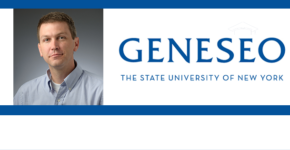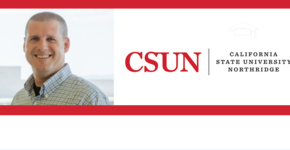Tag: Biology
-

Tammy Mildenstein, Cornell College – Fruit Bats
Another species is on the brink of near extinction. Tammy Mildenstein, assistant professor of biology at Cornell College, explores Old World fruit bats and why their decline is harmful to their environment. Tammy Mildenstein is an assistant professor of biology at Cornell College in Mount Vernon, Iowa. She teaches courses in biology, including Ecology, Environmental…
-

Jonathan Wilson, Haverford College – Re-Animating Extinct Plants
Planetary history can hold keys to preserving species when the climate changes. Jonathan Wilson, assistant professor of biology and environmental studies at Haverford College, examines how plant fossils can help current plants survive for generations. I received my B.A. in Computer Science and Earth and Planetary Sciences from Johns Hopkins University in 2003 and a…
-

Travis Bailey, SUNY Geneseo – Conquering Vision Loss through Regenerative Biology
Zebrafish could hold clues to helping us repair our eyesight. Travis Bailey, assistant professor of biology at SUNY Geneseo, examines how zebrafish repair their eyes and what we can learn to benefit ourselves in the future. Biologist Travis Bailey gained an interest in regenerative biology as an undergraduate student and forged his pathway into the…
-

Jonathan Kelber, California State University, Northridge – Pancreatic Cancer
Pancreatic cancer is a dire diagnosis. Jonathan Kelber, associate professor of biology at California State University Northridge, discusses a new effort to fight back against the disease. I teach undergraduate and graduate courses on cell/molecular biology and cancer. My research focuses on understanding the mechanisms by which cancers begin and then later acquire the ability…
-

Aaron Krochmal, Washington College – Animal Learning, Memory and Migration
Animals migrate over long distances – but how do they know where to go? Aaron Krochmal, associate professor of biology at Washington College, discusses this question. Aaron R. Krochmal, an Associate Professor of Biology at Washington College, is an integrative organismal biologist interested in the behavior, physiology, and ecology of reptiles. Specifically, he combines these…
-

Megan Dobro, Hampshire College – Bacteria
Bacteria is everywhere, but how much do we know about it? Megan Dobro, assistant professor of human biology at Hampshire College, explores how we’re learning more about these tiny machines. Megan Dobro, assistant professor of human biology, received her B.S. from Bridgewater State University and her Ph.D. in molecular biology from the California Institute of…
-

Noelle Nelson, University of Kansas – Working Memory and Satiation
Some of us can get tired of a song quickly, while others listen over and over again. Noelle Nelson, assistant professor of marketing and consumer behavior, at the University Of Kansas School Of Business, examines whether working memory can help decide whether we get tired of something in a hurry, or not at all. Noelle…
-

Colin Camerer, California Institute of Technology – Testosterone
Does testosterone increase mental mistakes? Colin Camerer, professor of behavioral economics at the California University of Technology, examines this question. Colin Camerer is a pioneer in behavioral economics and in neuroeconomics. He is interested in how psychological forces and their deeper neuroscientific foundations influence economic decisions involving individuals and markets. In his research, he uses…
-

Joseph Bennett, Carleton University – De-Extinction
Should we bring species back from extinction? Joseph Bennett, assistant professor and conservation biologist at Carleton University, explores if making a real life Jurassic Park would be a good idea. Joseph Bennett is a conservation biologist and Assistant Professor at Carleton University in Ottawa, Canada. Research in his lab focusses on statistical and mathematical tools…
-

Matthew Pase, Boston University – Diet Soda and Accelerated Brain Aging
Put down the diet soda. Matthew Pase, fellow in the department of neurology at the Boston University School of Medicine, looks into whether diet drinks are more harmful than previously thought. Matthew Pase is a fellow in the MED neurology department at Boston University Medical School and an investigator at the FHS. Diet Soda and…
